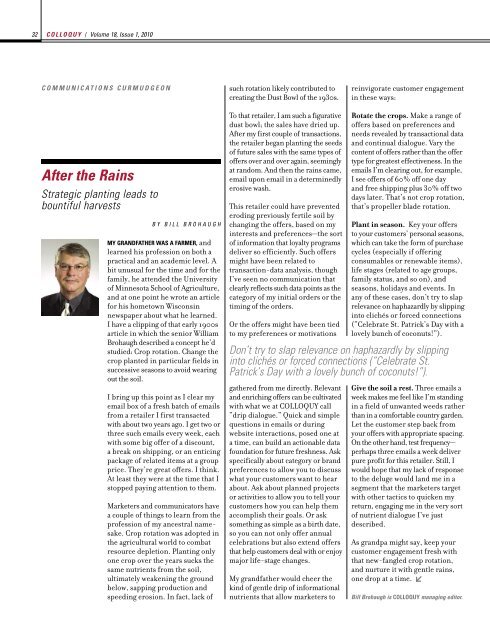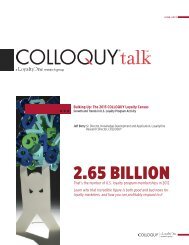Transformers - Colloquy
Transformers - Colloquy
Transformers - Colloquy
You also want an ePaper? Increase the reach of your titles
YUMPU automatically turns print PDFs into web optimized ePapers that Google loves.
32<br />
C O L L O Q U Y / Volume 18, Issue 1, 2010<br />
C O M M U N I C A T I O N S C U R M U D G E O N<br />
After the Rains<br />
Strategic planting leads to<br />
bountiful harvests<br />
B Y B I L L B R O H A U G H<br />
MY GRANDFATHER WAS A FARMER, and<br />
learned his profession on both a<br />
practical and an academic level. A<br />
bit unusual for the time and for the<br />
family, he attended the University<br />
of Minnesota School of Agriculture,<br />
and at one point he wrote an article<br />
for his hometown Wisconsin<br />
newspaper about what he learned.<br />
I have a clipping of that early 1900s<br />
article in which the senior William<br />
Brohaugh described a concept he’d<br />
studied: Crop rotation. Change the<br />
crop planted in particular fields in<br />
successive seasons to avoid wearing<br />
out the soil.<br />
I bring up this point as I clear my<br />
email box of a fresh batch of emails<br />
from a retailer I first transacted<br />
with about two years ago. I get two or<br />
three such emails every week, each<br />
with some big offer of a discount,<br />
a break on shipping, or an enticing<br />
package of related items at a group<br />
price. They’re great offers. I think.<br />
At least they were at the time that I<br />
stopped paying attention to them.<br />
Marketers and communicators have<br />
a couple of things to learn from the<br />
profession of my ancestral name -<br />
sake. Crop rotation was adopted in<br />
the agricultural world to combat<br />
resource depletion. Planting only<br />
one crop over the years sucks the<br />
same nutrients from the soil,<br />
ultimately weakening the ground<br />
below, sapping production and<br />
speed ing erosion. In fact, lack of<br />
such rotation likely contributed to<br />
creating the Dust Bowl of the 1930s.<br />
To that retailer, I am such a figurative<br />
dust bowl; the sales have dried up.<br />
After my first couple of transactions,<br />
the retailer began planting the seeds<br />
of future sales with the same types of<br />
offers over and over again, seemingly<br />
at random. And then the rains came,<br />
email upon email in a determinedly<br />
erosive wash.<br />
This retailer could have prevented<br />
eroding previously fertile soil by<br />
changing the offers, based on my<br />
interests and preferences—the sort<br />
of information that loyalty programs<br />
deliver so efficiently. Such offers<br />
might have been related to<br />
transaction-data analysis, though<br />
I’ve seen no communication that<br />
clearly reflects such data points as the<br />
category of my initial orders or the<br />
timing of the orders.<br />
Or the offers might have been tied<br />
to my preferences or motivations<br />
gathered from me directly. Relevant<br />
and enriching offers can be cultivated<br />
with what we at COLLOQUY call<br />
“drip dialogue.” Quick and simple<br />
questions in emails or during<br />
website interactions, posed one at<br />
a time, can build an actionable data<br />
foundation for future freshness. Ask<br />
specifically about category or brand<br />
preferences to allow you to discuss<br />
what your customers want to hear<br />
about. Ask about planned projects<br />
or activities to allow you to tell your<br />
customers how you can help them<br />
accomplish their goals. Or ask<br />
something as simple as a birth date,<br />
so you can not only offer annual<br />
celebrations but also extend offers<br />
that help customers deal with or enjoy<br />
major life-stage changes.<br />
My grandfather would cheer the<br />
kind of gentle drip of informational<br />
nutrients that allow marketers to<br />
reinvigorate customer engagement<br />
in these ways:<br />
Rotate the crops. Make a range of<br />
offers based on preferences and<br />
needs revealed by transactional data<br />
and continual dialogue. Vary the<br />
content of offers rather than the offer<br />
type for greatest effectiveness. In the<br />
emails I’m clearing out, for example,<br />
I see offers of 60% off one day<br />
and free shipping plus 30% off two<br />
days later. That’s not crop rotation,<br />
that’s propeller blade rotation.<br />
Plant in season. Key your offers<br />
to your customers’ personal seasons,<br />
which can take the form of purchase<br />
cycles (especially if offering<br />
consumables or renewable items),<br />
life stages (related to age groups,<br />
family status, and so on), and<br />
seasons, holidays and events. In<br />
any of these cases, don’t try to slap<br />
relevance on haphazardly by slipping<br />
into clichés or forced connections<br />
(“Celebrate St. Patrick’s Day with a<br />
lovely bunch of coconuts!”).<br />
Don’t try to slap relevance on haphazardly by slipping<br />
into clichés or forced connections (“Celebrate St.<br />
Patrick’s Day with a lovely bunch of coconuts!”).<br />
Give the soil a rest. Three emails a<br />
week makes me feel like I’m standing<br />
in a field of unwanted weeds rather<br />
than in a comfortable country garden.<br />
Let the customer step back from<br />
your offers with appropriate spacing.<br />
On the other hand, test frequency—<br />
perhaps three emails a week deliver<br />
pure profit for this retailer. Still, I<br />
would hope that my lack of response<br />
to the deluge would land me in a<br />
segment that the marketers target<br />
with other tactics to quicken my<br />
return, engaging me in the very sort<br />
of nutrient dialogue I’ve just<br />
described.<br />
As grandpa might say, keep your<br />
customer engagement fresh with<br />
that new-fangled crop rotation,<br />
and nurture it with gentle rains,<br />
one drop at a time.<br />
Bill Brohaugh is COLLOQUY managing editor.




